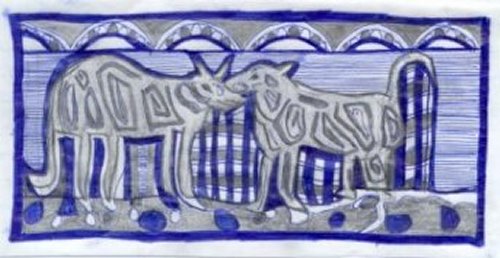REVIEWING BOOKS IN AUSTRALIA
By Magdalena Ball

Thylacinus cynocephalus - "The pouched dog with the wolf's head".
Welcome to the tenth issue of Thylazine: The Australian Journal of Arts, Ethics & Literature.
A recent article on the Australian Culture and Recreation website states that poetry has shaped the Australian national character: "Others may argue and say it was Gallipoli, or sport, or the landscape. But we all know that legend is what shapes national character and our legends are told and retold across time and space through poetry." At the same time, while poetry, and indeed all forms of art, may be used as a vehicle for subversion or politics, ultimately, as Auden said so eloquently:

|
Poetry makes nothing happen; it survives
In the valley of its making where executives
Would never want to tamper, flows on south
From ranches of isolation and the busy griefs,
Raw towns that we believe and die in; it survives,
A way of happening, a mouth." |
So poetry is, and always will be, everything and nothing - the most exalted form of self-expression - words picked over, spilled forth from pure emotion, and tightened until they skip past the need for standard syntax and grammar, moving directly from intent to impact. It survives, like all great forms of art, in spite of politic and trend, and in spite of its historically low market potential. Meanwhile, the book publishing market is in a tremendous state of flux, competing across genres and around the world like never before.
Even discounting a decreasing public attention span from fast food, fast television with viewer guided digitally enhanced reality programming, fast-paced video games, and of course the Internet, there are graphic novels, multimedia, the increasing interest in young adult novels, and e-books all competing heavily for reader attention. Small local publishing companies like Five Islands Press and journals like Meanjin, Island, Salt, Heat, and a variety of anthologies have kept the Australian poetry scene selective, lively and contemporary - a long way from the rarified air of academics, or the cute sing song rhymes of the bush.
But publishers of Australian poetry are faced with a paradox. On the one hand, Australian poetry has garnered worldwide interest like never before, and poets like Les Murray, Dorothy Porter, Robert Adamson, and Lily Brett have become literary superstars, handled by mainstream publishers, with reasonably handsome book sales.
On the other hand, government funding for poetry journals and books has seriously decreased, and the combination of increasing imports, easily accessible print on demand publishing, along with the explosion of online poetry journals with its nod to almost instant, cheap, and globally available self-expression, has made the need for thorough and objective review processes more important than ever. Where do readers and writers focus their limited attention? How can a new or unpublished poet obtain publicity, serious respect, and maybe even sales for his or her work? That's why journals like Thylazine, and indeed the entire independent review process remain critically important.

|
There are plenty of spin doctors prepared, for a fee, to write one paragraph promotional blurbs, and many websites and magazines, also for a fee, prepared to publish these blurbs under the guise of a "review." Legitimate publications may also publish a one or two paragraph "review" which provides only the slightest inkling of what a book is about, or worse, a book report which gives little more than a plot summary without a clear analysis of quality. |
Neither of these are reviews, and like the 'paid for' advertisement, do nothing to further the cause of objective assessment, or to promote and uncover great (rather than simply commercially viable) literature in all of its forms. Because of its low commercial potential, poetry, which is often self-published, or published by small houses with even smaller budgets, may have even less chance to obtain the kind of in-depth critical analyses aimed at the common reader which a good review offers. A through and objective review by a person who has a good deal of reverence for and experience with language and literature remains the most important means of focusing readers' attention. The key is the fundamental element of substantiated criticism, both positive and negative.
A good review is the arbiter which every author works towards, and tends to work outside of the fickle fashions of the lucrative. A good poetry review looks at work in the context of accepted literary, historical, sensory, qualitative, or aesthetic standards, and identifies its deeper meaning, emotional impact and beauty. It explores what works, and how, and what doesn't work, and why.
Things like the overall structure of the book, the relationship between poems, thematics, poetic techniques, rhythm, scan, and the power of imagery within individual poems are all explored. It is an analysis as much as a critique, and for the poet, provides a re-useable and reliable form of promotion which no advertisement can match. For the reader, a reviewer with similar tastes can cut a swathe though the morass, identifying work which deserves notice. It's a job not to be taken lightly. Nor should authors ever have to pay for a review, as that significantly compromises the objectivity and integrity of the process.

|
So, as both poet and reader, as well as a reviewer, I can only feel grateful to publications like Thylazine, which aim to provide a significant number of detailed, substantiated and thorough reviews of poetry regardless of how famous or potentially lucrative a poetry collection is, and examining the work of first time poets alongside more well-known poets who have struggled for years to make a mark in the global literary world. |
Again, the key criteria here is quality, a nebulous and shifting mark I know, but also one which we can't forget, and which reviewers contribute in large part to ensure that we don't forget, in the otherwise desperate bid for sales in a frenzied market full of poorly written self-help guides. The works here are explored in the kind of detail that will help readers decide whether any of these are poets whose work belongs in their homes, to be read and explored in greater depth, towards a writer's ultimate goal - regular reference and posterity. Readers should gain an enticing taste of what is happening in Australian poetry today, bring out more names into the public arena, and ideally broadening the public taste and desire for poetry in general.
And that can only be a good thing. For although poetry may change nothing externally, may bypass the executives in their boardrooms - the country and company directors who make policy - it participates at the deepest level of what it means to be a human being. It bridges the gap between people and goes beyond the superficial layers which we put on display. It opens doors and frees us in ways that politicians cannot begin to touch. That is why, funding or no, lucrative or not, poetry will continue to flourish regardless of how publishing trends change.
Without the kind of fluid language that poetry provides us with, we are stilted, stunted, unable to conceive of what we can't speak about. Great poetry opens doors, takes us beyond the cliches and soundbites of the media, and gives us new ways of communicating.. That is, ultimately, what this kind of review publication, and others, such as my own site The Compulsive Reader, is all about -- seeking to unearth poetry worthy of attention, through the process of objective, substantiated, attentive, and above all, devoted, reviewing.
Magdalena Ball (Guest Editorial)

Thylazine thanks the following people for their generosity: The Literature Board of The Australia Council for The Arts ($2,500.00) towards Thylazine No.10 and The Thylazine Foundation's charitable works.
A special thanks to the contributors and staff; Melissa Ashley, Janine Baker, Magdalena Ball, Connie Barber, Greg Barns, Ken Bolton, Cameron Borg, Janice Bostok, Andrew Burke, Peter Davis, John Foulcher, Sam Green, Jeff Guess, Liz Hall-Downs, Coral Hull, (that's me), Liz Hall-Downs, Karen Knight, Rosanna Licari, Kerry Reed-Gilbert, Tom Shapcott, Elaine Schwager, Tim Steward from Scream Feeder, Sandra Thibodeaux, Brenda Saunders and the many artists and photographers whose work is included in this issue.
And others; Five Islands Press, Grendon Press, HeadworX Publishers, Interactive Press, Lythrum Press, PressPress, University of Queensland Press, Wild Peony Pty Ltd, Allen Jesson and his Build an orphange project at A Gift of Poetry, Thom The World Poet & our friends from The Poets Pantry in Austin, Texas (USA), University of Queensland Press, Wild Pheony and the poets who contribute their books for review, the Australian companies who support our Kid's Xmas hamper project by either giving wholesale vegan healthfood food products and/or paying frieght costs to Darwin (near Bali), The Australian Nougat Company, E.C. Choate & Co., Orgran, Pureharvest, Thingz in Casuarina Square for discounted gift bags and boxes, The Salvation Army in Palmerston for kindly offering to distribute the hampers to disadvantaged kids and their families, The Red Cross in Darwin who have offered to distribute Thylazine Foundation gift hampers to 80 elderly people via Meals in Wheels and Home Care, Coles in Casuarina for providing a 20.00 gift voucher and to all the poets who went without fees in order that we use the funds to purchase food, Aileen Kelly, Kerry Reed-Gilbert, Joyce Parkes, Liz Hall-Downs, Edwin Wilson, Brenda Saunders, Allen Jesson and Peter Davis, to Kindi and Binda who renew my dreams on a daily basis, the black angus cows from Rylstone: Molly, Emma, Amanda, Stevie, Maggie, Ruby, Rachel, Faith and Caliban the steer; including Charlie Rosenberg and the crew at The Institute for Global Communications (IGC) and The EnviroLink Network (San Francisco, USA) without whose assistance this website would not be possible.
Ammendments: Thylazine wishes to make ammendments to Sharon Olinka's review of Pam Brown's book The Text Thing (Little Esther Books, 2000) that appeared in Thylazine No.9, March 2004. For Americans, Nov. 11 is Veterans Day, to remember all soldiers killed during wartime, similar to Remembrance Day in Australia, which commemorates World War I. Sharon Olinka's mention of 9/11 given within the review would indicate that, after 2001, even the phrase "the 11th" and the word "memorial" are more loaded, for both poets and their readers now than they were previously. We apologise to poet Pam Brown and her publisher if this was taken to mean that her poem was a direct reference to 9/11, which it obviously is not. In the meantime check out Sharon's review in issue 9 and buy Pam's book!
About the Writer Magdalena Ball

|
Magdalena Ball has been writing professionally for over 20 years. She graduated Summa Cum Laude from CCNY (New York) with a BA in English
Literature. She also studied English literature and business at a postgraduate level at Oxford University in the UK and Charles Sturt University in Australia and has an Master of Business. A wordsmith of all-trades, her publication credits includes fiction, poetry, reviews, interviews and essays in a wide range of online and print publications and anthologies, including Skive Magazine, Perigree, Harpweaver, Imago, Drexel Online Journal, and Midwest Book Reviews. She is the author of The Art of Assessment: How to Review Anything, Editor-In-Chief of The Com, information manager for Orica, wife of one, mother to three, and is finalising her first novel, Sleep Before Evening. |
[Above] Photo of Magdalena Ball by Dominic Ball, 2004.
I Next I
Back I
Exit I
Thylazine No.10 (September, 2004) |



